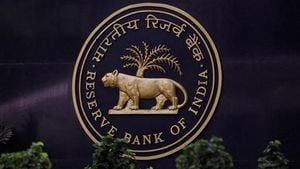In the wake of recent seismic activity, Thailand's Stock Exchange (SET) is taking proactive measures to ensure stability and reassure investors. On March 31, 2025, the Department of Mineral Resources reported 22 earthquakes within 24 hours across four northern provinces: Mae Hong Son, Chiang Mai, Phrae, and Tak. These tremors have raised concerns about their impact on the economy and the stock market, particularly following a significant earthquake near Mandalay, Myanmar, just days earlier.
The tremors in Thailand were mainly recorded in Mae Hong Son, where 12 earthquakes occurred, with magnitudes ranging from 1.6 to 2.9. Notably, 9 of these were attributed to normal faulting in the area. In Phrae, 6 tremors were recorded, with magnitudes between 1.9 and 2.8, also due to geological shifts. Chiang Mai experienced 3 tremors, while Tak had one minor tremor at a magnitude of 2.1. Fortunately, there have been no reports of damage or significant tremors felt by residents in these provinces.
Amid these geological events, the SET has been monitoring the situation closely. Professor Dr. Pornong Bussaratkul, Secretary-General of the Securities and Exchange Commission (SEC), assured the public that the Thai capital market has demonstrated resilience through various crises, including natural disasters. "The stability of the market remains robust," he stated, emphasizing the importance of accurate information dissemination during uncertain times.
To bolster investor confidence, the SET has implemented a Business Continuity Plan (BCP) to ensure uninterrupted operations. Mr. Assadej Kongsiri, Executive Vice President of the SET, confirmed that all systems are functioning normally and trading can proceed without disruption. He noted, "We are fully prepared to operate and provide services as usual, despite the recent tremors. Our main priority is the safety of our investors and maintaining market stability."
The SEC and SET have also coordinated with financial institutions to ensure that they are ready to assist customers affected by the earthquakes. The Bank of Thailand (BOT) reported that the financial sector remains strong and operational, with measures in place to support clients. Deputy Governor Mr. Keree Keeratiratana highlighted the importance of timely assistance, stating, "We have instructed commercial banks to provide necessary support to customers, including reducing minimum payment rates and restructuring debts where needed."
In terms of structural integrity, the SET has conducted extensive inspections of buildings in the Bangkok area, reviewing approximately 13,000 structures, with 10,000 already assessed. Only two buildings were flagged for issues that require further examination. This proactive approach aims to ensure that the infrastructure remains safe and resilient against potential aftershocks.
Meanwhile, the insurance sector is also on alert. The Office of Insurance Commission (OIC) has communicated with all insurance companies to monitor the situation and prepare for any claims that may arise due to the earthquakes. Mr. Chuchat Pramoolphol, Secretary-General of the OIC, reassured that the financial health of the insurance companies remains strong, stating, "We are ready to respond to claims and assist those affected by the earthquakes."
In light of the recent seismic activities, experts believe that while there may be short-term impacts on investor sentiment, the long-term outlook remains positive. Ms. Chavinda Hanratthanakul, President of the Association of Investment Management Companies (AIMC), noted that institutional investors typically diversify their portfolios, which mitigates panic selling during crises. "Historically, we've weathered numerous disasters, including tsunamis and major floods, so we expect to navigate this situation as well," she added.
As Thailand continues to assess the aftermath of the earthquakes, the focus remains on ensuring public safety and maintaining economic stability. The SET and regulatory agencies are committed to providing transparent information and support to investors, reinforcing confidence in the Thai market. With the resilience demonstrated by the financial sector and the extensive measures in place, stakeholders are hopeful that the market will recover swiftly from any potential disruptions caused by the recent seismic events.
In conclusion, the combination of proactive measures by the SET, the resilience of the financial sector, and the support from regulatory bodies positions Thailand well to handle the aftermath of these earthquakes. Investors are encouraged to remain informed and make decisions based on reliable data as the situation evolves.






